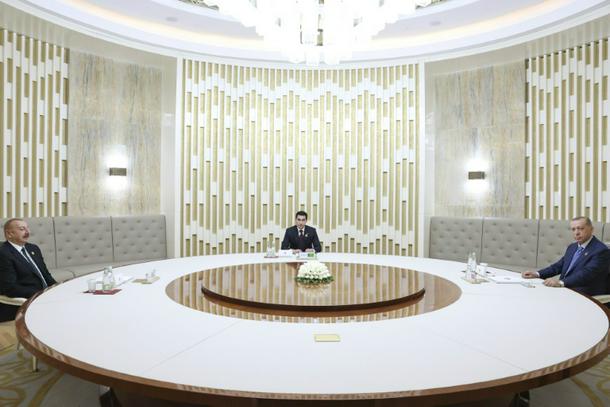
The leaders of Turkey, Azerbaijan and Turkmenistan want to create a new natural gas link to Europe
Istanbul (AFP) - Turkish President Recep Tayyip Erdogan on Wednesday backed the creation of a new natural gas pipeline that could ease Europe’s dependence on Russia by linking up with energy-rich Turkmenistan.
The Turkish leader’s remarks came during a three-way summit with the presidents of Turkmenistan and Azerbaijan in the isolated Central Asian state’s city of Awaza.
The meeting came with Europe trying to end its dependence on Russian energy following the Kremlin’s invasion of Ukraine.
Erdogan has tried to play a role of a middle man in the conflict by maintaining close working relations with Russian President Vladimir Putin while supplying Kyiv with arms.
He has backed Putin’s idea of creating a new “gas hub” in Turkey that could supply European clients while bypassing existing pipelines running through Ukraine and under the Baltic Sea.
But he also lent his support on Wednesday to a new project that could link Turkmenistan with an existing pipeline running from Turkey to Azerbaijan.
“We carry Caspian Sea gas to Europe via (the existing) corridor, which is the backbone of the Trans-Anatolian natural gas pipeline,” Erdogan said in remarks released by his office.
“We need to launch work on transporting Turkmen natural gas to Western markets in the same way.”
The US Energy Information Administration lists Turkmenistan as the world’s sixth-largest holder of proven natural gas reserves.
Much of its past gas volumes have reached world markets via pipeline running to Russia.
But its has also been ramping up supplies to China and is looking for ways to access other markets via Turkey.
Erdogan has long dreamt of using Turkey’s location on the edges of the Middle East and Europe to turn it into one of the world’s main centres of the energy trade.
Central Asian countries have also been reassessing their once-close relations with Moscow since Russia’s war on Ukraine.
Russia’s decision to limit gas supplies in retaliation for Western sanctions have left European countries scambling for supplies as they head into the cold winter months.